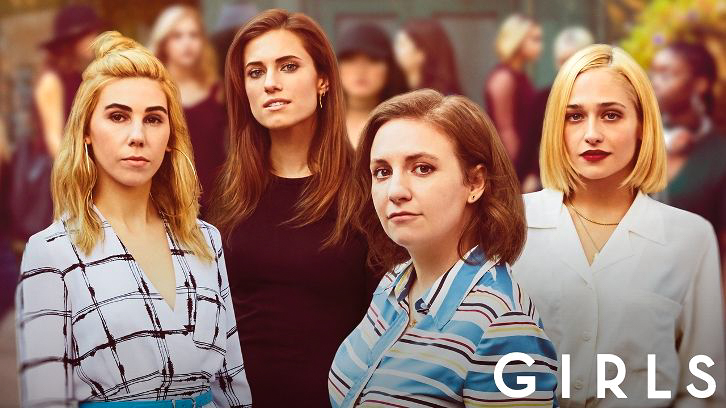
c/o spoilertv.com
This past Sunday, the final season of “Girls” premiered on HBO, featuring the same unrefined humor and quirky characters that first attracted audiences back in 2012. Sealed with Lena Dunham’s imaginative flare, the episode reintroduces the messy bits that season five’s finale left us clinging to: the fractured friendships and budding relationships that make Hannah Horvath (Dunham) feel more like a dumpling than a woman.
Hannah’s evolving writing career sets the scene for the season’s first episode, as she gets published in The New York Times and lands a job at a favorite publication. Her debut assignment sends her on a getaway to a female surf camp in the Hamptons, and her weekend quickly unravels as an escapade of distinctly “Hannah” moments. The trip strings together scenes that encapsulate Hannah’s character, beginning with an tube of sunscreen that explodes in her suitcase, and concluding with her consideration of the “toxic negativity” that colors her life in New York.
Between these bookends, Hannah rejects the athletic endeavors that brought her to the Hamptons in the first place, resorting to taffy blue cocktails at the hotel bar, where she begins her weekend fling with surf instructor Paul-Louis (Riz Ahmed). His character introduces her to a foreign lifestyle swathed in ease and positivity, which, in typical fashion, she momentarily thinks she can maintain.
In her efforts to eliminate “bad vibes,” Hannah indulges in a sea-shore makeout with Paul-Louis, as waves tug at her flimsy bathing-suit and sea-water stings her eyes. George Harrison’s “My Sweet Lord” punctuates this intentionally un-sexy moment. Yet, as the weekend rolls to an end, Hannah discovers Paul-Louis is in an open relationship, which quickly dims her fantasies of their simple Hamptons romance and spurs the audience’s anticipation of her return to New York.
Back in the city, we’re faced with the complications that Hannah’s group of friends (and exes) are facing. Marnie is in the middle of her divorce with Desi (Ebon Moss-Bachrach) and must confront the potential schism of their band, while maintaining her new relationship with Ray (Alex Karpovsky). Meanwhile, Shosh readjusts to her life back in the States after being abruptly fired from her job in Tokyo. She and Ray, who dated several seasons ago, begin spending more time together, bonding over their mutual distaste for New York Times columnist Paul Krugman. True to form, Marnie becomes anxious, re-embracing Desi because he “truly sees her” and neglecting the fact that she still has a boyfriend.
At the source of Hannah’s current dumpling-over-woman state lies Jessa (Jemima Kirke) and Adam (Adam Driver), whose relationship catalyzed her New York Times essay, entitled Losing My Best Friend to My Ex-Boyfriend. In our brief encounter with the new couple, Jessa spoons runny yogurt in her mouth in their shabby apartment, naked and comfortable. Adam joins her with another spoon.
Together, the episode entwines the unkempt relationships that we’ve tracked since the show’s genesis in 2012. “Girls” continues to spotlight the vices, selfish tendencies, and idiosyncrasies of Hannah, Jessa, Shosh, and Marnie, crafting these individual characters so that they further fuel the show’s vivacity. We see Hannah, just as immature as the first time we met her, prodding spaghetti into her mouth over a dinner with her parents in the pilot episode, claiming she was a “growing girl.” Since that moment, when her parents finally cut her off, she has remained that growing girl, her interests diverging and twisting in every direction, her mind and heart still malleable.
While the characters may provoke our frustrations, the show offers an endearing honesty that has had audiences hooked since it began. We’re forced to wonder how they could be so egocentric, yet simultaneously reflect on ourselves and realize we can absolutely relate. We often behave like Hannah and Marnie, who constantly orbit in petty drama, always have something to say even if it’s wildly uninformed, and find satisfaction in having their voices heard. Thus, Lena Dunham writes a storyline that both hyperbolizes the nuances of being young and also manages to tap into the grains of truth embedded in our generation.
The season six premiere sustains the unsure immaturity that links the series. Hannah bobs in her familiar realm of indecision, unsure of who or what she wants. For her, there are always moments where the chaotic dust seems to settle, and she thinks she has a grip on her life, but the calm soon cracks, breeding another onset of problems for her to strain and organize.
Despite the doubts and insecurities that arise, Hannah and her friends remain a group of girls open to exploration and novelty; they want to achieve something in whatever category of success they can find, seeking solace amidst the messiness of their lives. The start of the final season bears these themes, sewn together by Lena Dunham’s raunchy humor and the show’s brilliant soundtrack. For now, we can await the aftermath of Hannah’s Hamptons trip and her reunion with her many unspooling relationships back in the city.